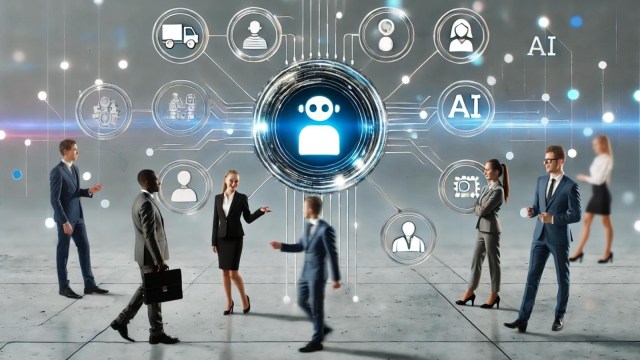AI agents and the future of education: A revolution set to begin
The year 2025 will mark the transition of education from a traditional model to one that is agile, inclusive, and future-ready.
 AI agents working with humans. (Image generated using AI)
AI agents working with humans. (Image generated using AI)By Akhil Damodaran
As the New Year approaches, I find myself reflecting on the year that has passed. It has been a year of remarkable progress, not just for individuals but for humanity as a whole. We have transformed into creators of a world far more advanced than we could have envisioned, and for that, we should be profoundly grateful. The strides we have made stand as a testament to human ingenuity and determination.
The numbers speak for themselves: The global artificial intelligence (AI) market was valued at $142.3 billion in 2023 and is projected to grow at a compound annual growth rate (CAGR) of 36.2%, reaching an astonishing $1,811.8 billion by 2030.
In education, the use of AI is estimated to expand by 47.5% annually, reflecting its transformative potential across learning environments. This rapid adoption underscores how AI is becoming indispensable in modern life.
What makes AI intriguing is that it shares parallels with human evolution: it learns, adapts, and finds alternative pathways to progress when faced with challenges. AI algorithms are designed to optimise and overcome obstacles through iterative improvements, much like we do in life. The marvel of this phenomenon is best exemplified in tools like ChatGPT. Over time, ChatGPT has become more interactive, intuitive, and closer to human intelligence. To put its impact into perspective, consider this: it took ChatGPT just five days to reach one million users—an unprecedented milestone that highlights its relevance in the digital age.
Looking ahead to 2025, I foresee an era of profound transformation driven by the rise of AI agents. These agents, akin to the fictional Jarvis from Iron Man, are customisable AI tools that function according to a set of user-defined guidelines. They can collaborate with users or operate autonomously, adhering to the principles set by their creators. This capability is poised to revolutionise numerous industries, none more significantly than education.
By late 2024, AI agents had already begun quietly reshaping the educational landscape. In the coming year, their impact will become undeniable. Imagine a world where AI agents handle the most time-intensive aspects of education: course planning, evaluations, assessments, and even the creation of specialised certification programmes. These agents will serve as indispensable partners to educators, allowing them to focus on their core strengths—mentoring and inspiring students.
AI agents are already aiding students in selecting the right courses. At IILM, we have implemented systems where these agents analyse a student’s interests, past performance, and career aspirations to recommend courses tailored to their goals. This level of personalisation ensures that students remain on the right track, maximising their potential and aligning their academic journey with their future ambitions.
Now, consider the potential of emerging features like ChatGPT’s new vision capability. This technology could revolutionise attendance systems by accurately capturing real-time attendance in classrooms. Such advancements not only save time but also enhance transparency and efficiency in educational administration.
This transformation is no longer a distant dream. Already, AI is playing pivotal roles in personalised learning, automating administrative tasks, and providing real-time feedback. The next logical step is the seamless integration of AI agents into educational ecosystems to perform tasks with precision, speed, and adaptability.
The year 2025 will mark the transition of education from a traditional model to one that is agile, inclusive, and future-ready. It will redefine how we teach, learn, and grow. With AI agents at the forefront, education will break free from traditional systems and one-size-fits-all approaches, evolving into a dynamic and collaborative process tailored to the unique needs of every individual.
As we embrace this exciting new chapter, the possibilities that AI agents bring to education and beyond are boundless. The revolution has already begun, and the future promises to be nothing short of extraordinary.
This paradigm shift will also challenge content partners and companies to elevate their efforts, as AI agents can now be created by virtually anyone without the need for specialised coding skills. Furthermore, educators in schools and universities are increasingly empowered to develop their own AI agents, provided they have a basic understanding of English. This democratisation of AI development represents a significant leap forward, fostering innovation at all levels of education.
Imagine a scenario where a teacher conducts a class, and afterward, students pose their questions to a class agent. The agent then summarises the content with precision, tailored to the students’ needs. This is no longer a fantasy but a reality being implemented in many universities, including ours.
In 2025, we can anticipate an educational ecosystem that seamlessly integrates AI-driven tools to address the diverse needs of both learners and educators. With AI agents becoming more accessible and efficient, they will enhance the quality of education and redefine the very concept of learning.
From personalised course recommendations to real-time problem-solving and automated administrative support, the potential of AI agents is limitless. As we step into this transformative era, 2025 promises to be a year where innovation in education accelerates at an unprecedented pace, paving the way for a smarter, more connected, and inclusive future.
The writer is the dean of the School of Management at IILM University. Views are personal.







